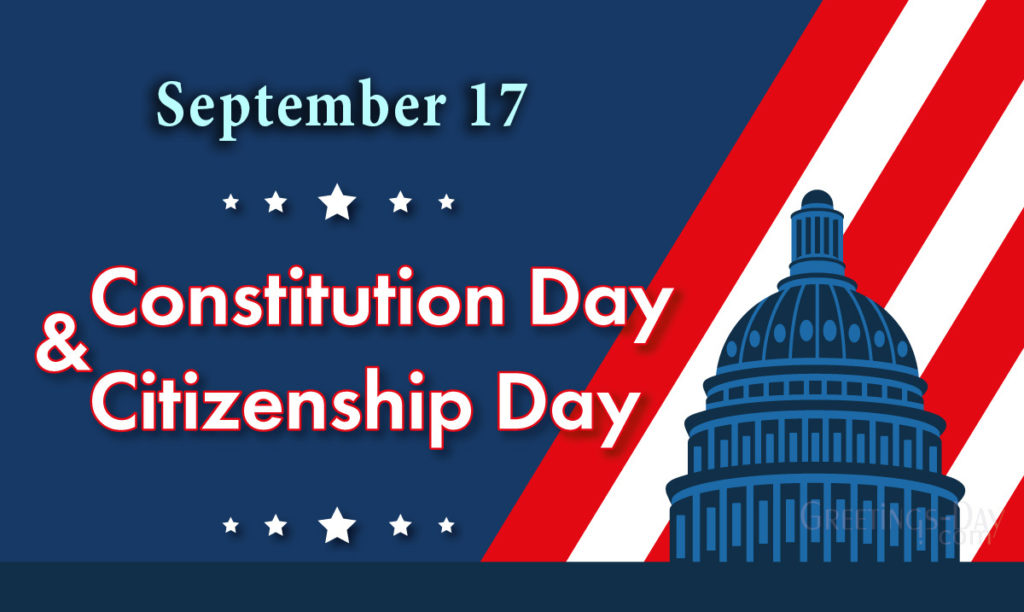Constitution Day and Citizenship Day is observed each year on September 17 to commemorate the signing of the Constitution on September 17, 1787, and “recognize all who, by coming of age or by naturalization, have become citizens.”

Today we celebrate Constitution Day, a day to recognize the adoption of the U.S. Constitution. In conjunction, we celebrate American Citizenship Day to recognize those who have become citizens of the United States. Throughout our history, the constitution and naturalized citizens have strengthened this country and helped form the foundation upon which it has become one of the most successful nations in the history of the world. On Citizenship Day (also known as Constitution Day), celebrated on September 17, we honor these cornerstones of American life.
Today we celebrate American citizenship, but what does that really entail?
The History of American Citizenship Day
Before the United States adopted the U.S. Constitution, it operated under the laws set forth in the Articles of the Confederation. However, the Articles of the Confederation were inherently flawed. It consisted of 13 articles that were ultimately insufficient to guide the states into a united future. In short, it gave the states too much individualism and didn’t do enough to prepare the newly founded nation for foreign trade and future armed conflicts. It also didn’t give the federal government the ability to control the economy due to a lack of taxation framework and commerce policies. It was immediately following the start of the American Revolution, and it wouldn’t be long before something stronger would be necessary to compel states to work together for the best interests of the new nation.
On May 25, 1787, the Constitutional Convention convened in Philadelphia to address the pressing issues caused by a too-weak federal government. It was comprised of delegates from many states, though some would not arrive until much later due to the travel constraints of the day. Whether the men there would revise the Articles of the Confederation or come up with some other solution was initially unclear, but they knew something had to be done or the United States would fail. George Washington, the man who led the Continental Army to victory during the American Revolution, was elected president of the convention, though he would have comparatively little to do with its framework.
Led by a framework proposed by James Madison, the delegation soon agreed that the Articles of Confederation would be scrapped for a new constitution. James Madison designed the Legislative, Judicial and Executive Branch structure of the government, which was mostly accepted without objection. The Legislative Branch was split into two parts to help protect wealthy landowner (minority) interests from the majority of citizens who didn’t own property. The delegation also came up with rules for electing/appointing the officials who would make up these bodies of government. These rules have dictated American politics since their inception.
Fine Tuning the Path to American Citizenship
The biggest flaw in the initial draft of the United States Constitution was the power it granted the federal government. Deliberations and edits curtailed this power, leading to a more balanced system of government that maintained the individualism of each state and the interests of the country as a whole. Benjamin Franklin thought that the final document was near enough to perfect that it would “astonish our enemies.” Later, the United States would realize other flaws, creating the first draft of the Bill of Rights (10 amendments to the document) and later several other amendments that served to modernize the document and correct its limitations.
When the United States Constitution was being drafted, issues of immigration weren’t at the forefront of their deliberations. So many of the people who lived in the United States were either immigrants themselves or just a few generations past the journeys that brought their families to the New World that it was just a natural part of being American. It has remained a natural part of American citizenship since. However, the process of becoming a citizen of the United States changed over time.
In the early 19th century, the United States began keeping records of who immigrated into the country. In 1875, it began passing its first immigration laws. The first few were directed at specific ethnicities, which led to the first cases of illegal immigration into the U.S. Over the course of the next century, the country would adapt and enact new laws that would eventually become the path to American citizenship as we know it today–a process that includes naturalization. The process of naturalization of citizenship is much celebrated by immigrants into the country, marked by a ceremony where new citizens take an oath to support and defend the United States Constitution.
American Citizenship Today
The origins of American Citizenship Day go back to the 1940s, when Congress deemed the third Sunday in May “I Am An American Day.” It was moved to September 17 in 1952 to honor the signing of the United States Constitution. It was still a day meant to celebrate immigrants and reaffirm citizens’ responsibilities under the U.S. Constitution. It wasn’t until 2004 that the holiday was renamed “Citizenship Day and Constitution Day.” It was an apt change, given the importance of the U.S. Constitution to life as an American citizen.
The U.S. Constitution provides the framework for leading the country. It contains amendments that give every single American citizen certain rights from birth or naturalization, rights that protect them from racial inequality, gives them free speech and certain religious liberties. Whether they know it or not, the U.S. Constitution has impacted the lives of every single person who has lived or will live in the United States of America. Whether a naturalized citizen or a citizen from birth, we all have the same rights, privileges and duties. American Citizenship Day is for everyone, though it holds a special place for those who swore an oath to uphold the U.S. Constitution and forsake allegiance to any other country.
Laura Goguet